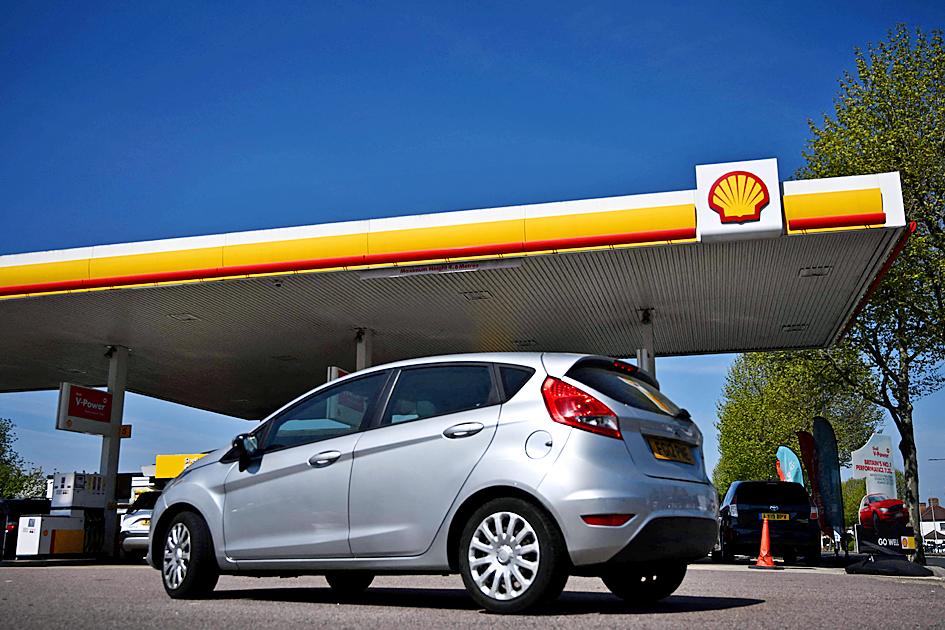British energy giant Shell PLC yesterday said its net profit soared 26 percent in the first quarter of the year as soaring oil prices offset a sizeable charge linked to its Russia exit.
Profit after tax leapt to US$7.1 billion compared with a year earlier, Shell said in a statement.
While the group took a US$3.9 billion charge on its exit from Russia after Moscow invaded Ukraine, it saw lower costs elsewhere.

Photo: AFP
Underlying earnings spiked almost threefold to a quarterly record of US$9.1 billion, sparking fresh calls in the UK for a windfall tax on energy majors.
British consumers are enduring a cost-of-living crisis caused by the highest rate of inflation in decades, also as economies reopen from COVID-19 pandemic lockdowns.
British Prime Minister Boris Johnson, who was yesterday facing a key midterm test in local elections, has dismissed calls for a windfall levy on oil giants, arguing it would slow their efforts to invest in cleaner energy.
Shell added that its revenue rallied 51 percent to US$84.2 billion in the first three months of the year.
Oil prices have surged in the past few months on concerns over tight supplies following the invasion of Ukraine by major oil and gas producer Russia.
“The war in Ukraine is first and foremost a human tragedy, but it has also caused significant disruption to global energy markets and has shown that secure, reliable and affordable energy simply cannot be taken for granted,” Shell chief executive Ben van Beurden said.
“The impacts of this uncertainty and the higher cost that comes with it are being felt far and wide,” he added.
The London-listed group last month flagged that it would take a hit of between US$4 billion and US$5 billion in the first quarter as a result of impairment from assets and additional charges relating to its Russian activities.
Shell announced in late February that it would sell its stakes in all joint ventures with Russian state energy giant Gazprom after the Kremlin launched its assault on Ukraine.
The company then decided in March to withdraw from Russian gas and oil in line with UK government policy.
Shell’s British rival BP PLC on Tuesday booked its biggest-ever quarterly loss, at US$20.4 billion.
This after BP booked a US$25.5 billion charge on its Russian withdrawal.
Shell added yesterday that it has begun the second tranche of its US$8.5 billion share buyback program that was unveiled in February.
The group’s share price rallied 3.1 percent to £2.95 in yesterday morning deals on London’s rising stock market.

TRADE WAR: Tariffs should also apply to any goods that pass through the new Beijing-funded port in Chancay, Peru, an adviser to US president-elect Donald Trump said A veteran adviser to US president-elect Donald Trump is proposing that the 60 percent tariffs that Trump vowed to impose on Chinese goods also apply to goods from any country that pass through a new port that Beijing has built in Peru. The duties should apply to goods from China or countries in South America that pass through the new deep-water port Chancay, a town 60km north of Lima, said Mauricio Claver-Carone, an adviser to the Trump transition team who served as senior director for the western hemisphere on the White House National Security Council in his first administration. “Any product going

STRUGGLING BUSINESS: South Korea’s biggest company and semiconductor manufacturer’s buyback fuels concerns that it could be missing out on the AI boom Samsung Electronics Co plans to buy back about 10 trillion won (US$7.2 billion) of its own stock over the next year, putting in motion one of the larger shareholder return programs in its history. South Korea’s biggest company would repurchase the stock in stages over the coming 12 months, it said in a regulatory filing on Friday. As a first step, it would buy back about 3 trillion won of paper starting today up until February next year, all of which it would cancel. The board would deliberate on how best to effect the remaining 7 trillion won of buybacks. The move

China’s Huawei Technologies Co (華為) plans to start mass-producing its most advanced artificial intelligence (AI) chip in the first quarter of next year, even as it struggles to make enough chips due to US restrictions, two people familiar with the matter said. The telecoms conglomerate has sent samples of the Ascend 910C — its newest chip, meant to rival those made by US chipmaker Nvidia Corp — to some technology firms and started taking orders, the sources told Reuters. The 910C is being made by top Chinese contract chipmaker Semiconductor Manufacturing International Corp (SMIC, 中芯) on its N+2 process, but a lack

NVIDIA PLATFORM: Hon Hai’s Mexican facility is to begin production early next year and a Taiwan site is to enter production next month, Nvidia wrote on its blog Hon Hai Precision Industry Co (鴻海精密), the world’s biggest electronics manufacturer, yesterday said it is expanding production capacity of artificial intelligence (AI) servers based on Nvidia Corp’s Blackwell chips in Taiwan, the US and Mexico to cope with rising demand. Hon Hai’s new AI-enabled factories are to use Nvidia’s Omnivores platform to create 3D digital twins to plan and simulate automated production lines at a factory in Hsinchu, the company said in a statement. Nvidia’s Omnivores platform is for developing industrial AI simulation applications and helps bring facilities online faster. Hon Hai’s Mexican facility is to begin production early next year and the